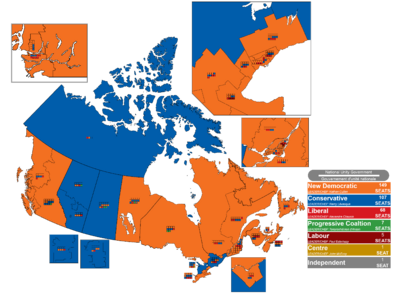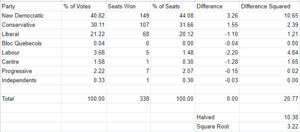5th CMHoC General Election
| |||||||||||||||||||||||||||||||||||||||||||||||||||||||||||||||||||||||||||||||||||||||||||||
338 seats in the House of Commons 170 seats needed for a majority | |||||||||||||||||||||||||||||||||||||||||||||||||||||||||||||||||||||||||||||||||||||||||||||
|---|---|---|---|---|---|---|---|---|---|---|---|---|---|---|---|---|---|---|---|---|---|---|---|---|---|---|---|---|---|---|---|---|---|---|---|---|---|---|---|---|---|---|---|---|---|---|---|---|---|---|---|---|---|---|---|---|---|---|---|---|---|---|---|---|---|---|---|---|---|---|---|---|---|---|---|---|---|---|---|---|---|---|---|---|---|---|---|---|---|---|---|---|---|
| |||||||||||||||||||||||||||||||||||||||||||||||||||||||||||||||||||||||||||||||||||||||||||||
Results of the 5th General Election | |||||||||||||||||||||||||||||||||||||||||||||||||||||||||||||||||||||||||||||||||||||||||||||
| |||||||||||||||||||||||||||||||||||||||||||||||||||||||||||||||||||||||||||||||||||||||||||||
The 5th CMHoC General Election was held on February 19, 2020 to elect the 338 members of the CMHoC's 5th model parliament. The writs of the election were dropped on February 10, 2020 by the Right Honourable thehowlinggreywolf in accordance with usual election rules.
The election saw the New Democratic Party remain as the largest party in parliament, however they failed to secure the 170 seats required to form a majority government, winning just 149 seats. The Conservative Party also had losses, yet remained the second largest party with 107 seats, due to strong wins in the Prairies and rural Ontario. In third was the Liberals, who jumped from no seats to 68, forming one of the strongest third party performances. Labour, who previously were the third party, dropped from 30 seats to 5 after a disappointing performance 8 seats went to other parties, with the Progressives winning 7, the Center Party winning a single seat, and one Independent from Manitoba, Brad Cochrane. It is also the first election since the passage of bill C-24, Mixed Member Proportional Representation Act, changing the voting system from single member First-Past-the-Post to proportional representation.
Background
In the 4th General Election the Liberal Democratic Alliance, now the New Democratic Party, won a small majority of 175 seats against the Conservative party due to strong wins in Quebec, British Columbia and Toronto. The former government under the Conservatives, led by Alexandre Chauvin, fell to opposition winning just 121 seats, mostly concentrated in Western Canada and Southern Ontario. The only other seats won were by the Labour Party, who won 35 seats from downtown Montreal and Toronto, along with some other seats around Canada. In December of 2019 Chauvin was removed by a vote of no condidence from his role as Conservative party leader. He was succeeded by Ivo Prokopiev, who resigned as Party Leader after a hunting accident in January 2020, Remy Lévesque succeeded him as Party Leader. Chauvin would go on to form his own party just before the 5th General Election, the Liberal Party, which was a more moderate party then the Conservatives, and included several notable former Conservative Shadow Cabinet members, including Wesley Parr and Lily Blackwell. Labour also had a change of leadership, when Paul Esterhazy became Leader.
Electoral Reform
In January of 2020, the NDP Government passed the Mixed Member Proportional Representation Act to change the electoral system of Canada. Previously, Canada was divided up in 338 single member districts with MP's elected by FPTP. This led to strong majorities, but a much less proportional legislature. The new voting system divided the nation into 32 multi-member districts, who's MP's are elected via closed list proportional using the d'Hondt method. The districts number of seats range from 19 (Vancouver City) to 3 (Territories).
Bill C-15
The Conservative opposition in December 2019, tabled Bill C-15in reaction to the high spending limits of third parties in the last election. The act limits the spending of gestured third parties to just $50,000 during the election period. The bill failed however, 81-149.
| Vote on bill C-15 | ||
| Ballot → | January 6, 2020 | |
|---|---|---|
| Yes | 81 / 338
| |
| No | 149 / 338
| |
| Abstentions | 108 / 338
| |
Campaign
Slogans and platform
| Party | English | Platform |
|---|---|---|
| New Democratic Party | "Forward, not Backward" |
|
| Conservative Party | "Order, Unity, Prosperity" |
|
| Labour Party | "Creating a Working Class Canada" |
|
| Liberal Party |
| |
| Progressive Party | "A new voice for Canada" |
|
Results
| Party | Leader | Candidates | Seats | Popular Vote | |||||
|---|---|---|---|---|---|---|---|---|---|
| 4th GE | Dissol. | 5th GE | +/- | Votes | % | ||||
| New Democratic | Nathan Cullen | 15 | 174 | 171 | 149 | 7,228,014 | 40.82% | ||
| Conservative | Remy Lévesque | 4 | 128 | 121 | 107 | 5,331,370 | 30.12% | ||
| Liberal | Alexandre Chauvin | 17 | New | 0 | 68 | 3,756,566 | 21.22% | ||
| Progressive | Tekaronhió:ken d'Anson | 1 | New | 0 | 7 | 392,747 | 2.22% | ||
| Labour | Paul Esterhazy | 4 | 35 | 30 | 5 | 651,086 | 3.69% | ||
| Centre | John McEnvo | 1 | New | 0 | 1 | 280,424 | 1.58% | ||
| Bloc Quebecois | Thomas Dubois | 1 | New | 0 | 0 | 7,594 | 0.04% | ||
| Independents | n/a | 1 | 0 | 0 | 1 | 59,266 | 0.33% | ||
Seats, of total, by party
Votes, of total, by party
Opinion Polls
| Polling firm | Last day of polling | NDP | CPC | LAB | LPC | BQ | PRO | CEN | Lead |
|---|---|---|---|---|---|---|---|---|---|
| Final Results | February 19, 2020 | 40.2 | 30.1 | 3.7 | 21.2 | 0.04 | 2.2 | 1.6 | 10.1 |
| CBC | February 18, 2020 | 42.0 | 30.3 | 2.4 | 21.4 | 0.7 | 2.1 | 1.1 | 11.7 |
| CBC | February 15, 2020 | 40.6 | 32.8 | 3.4 | 19.8 | 1.6 | 1.8 | 7.8 | |
| CBC | February 9, 2020 | 37.8 | 29.8 | 2.3 | 22.8 | 2.6 | 2.6 | 1.6 | 8 |
| CBC | February 3, 2020 | 37.7 | 29.8 | 2.9 | 21.8 | 2.7 | 3.0 | 0.5 | 7.9 |
| CBC | January 29, 2020 | 37.5 | 30.5 | 2.9 | 21.8 | 2.8 | 3.0 | 7 | |
| General Election | October 10, 2019 | 42.2 | 34.6 | 22.0 | DNE | DNE | DNE | DNE | 7.6 |
Aftermath
Due to no party reaching a majority of the seats, a coalition government became necessary for a Prime Minister to gain the confidence of the house. Due to the high amount of seats for the Liberal Party, they were able to become the kingmakers of the parliament, as no possible coalition would be possible without them. Both the Conservatives and NDP stated their intentions to attempt to form a coalition with them and began negotiations almost immediately.
One day after the election, the Labour Party announced their intentions to merge with the NDP due to such a disappointing result, giving the NDP an extra 5 seats, however the merger is still subject to a vote from both parties. The Progressives made public statements stating their willingness to participate in a confidence and supply arrangement with the NDP. This would not have given the NDP a majority of seats, still falling 8 short of the required 170. They had also began negotiations with the Liberals, however those talks allegedly fell apart quickly.
On February 21 2020, The Conservative and Liberal parties announced their intentions to form a coalition government. The Prime Ministership would start off with the Conservatives for the first half, then to the Liberals. Both parties will hold an equal number of cabinet roles. Following the announcement both the Centre Party and the Progressives joined the coalition government, taking up a single cabinet post each and Nathan Cullen tabled his resignation as Prime Minister to the Govenor General.
Remy Lévesque was invited to form government on the 22nd of February, and presented a Throne Speech to parliament on the 26th of February.
During the vote 16 Liberal MP's and 14 Conservative MP's rebelled and voted nay or abstained from the vote. Despite the coalition holding a majority of seats, these descanting votes led to the Throne Speech failing. Upon the votes failure, Prime Minister Remy Lévesque resigned as Prime Minister[1], Party Leader and his seat in the House of Commons. The Conservative Party appointed Lydia Miliken as acting leader and thus acting Prime Minister, however she stated that she has no intention of forming government[2].
Notes
^a Contested the 4th election as the Liberal Democratic Alliance.






